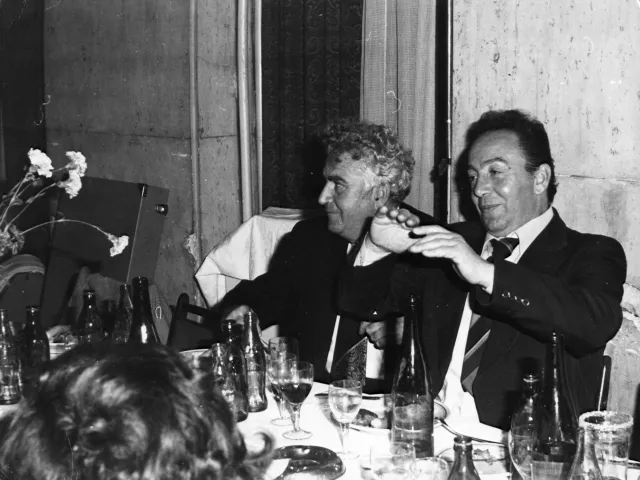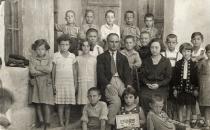This is me with my brother-in-law Jacques Fintsi at a restaurant on the occasion of the wedding of Sheli Alhalel to the construction engineer Vladimir Vladev, a Bulgarian, in Sofia in 1976. In the foreground are Jacques Fintsi (best man and husband of Ester Fintsi who is the sister of my wife Gitli) and I. What's interesting is that the photo was taken by the internationally famous photographer Simon Varsano, who was a young man then. He is a nephew of mine.
I have been to Israel three times. The first two times were before 10th November 1989. The first time was in 1964, the second time in 1973 and the third time in 1993. The first two times I was with my wife and the last time I was alone. Of course, I noticed the big difference between the early and late Israel, I liked it there more and more each time. But that doesn't mean that I have something against Bulgaria, to the contrary. The totalitarian times weren't dark times, although young people nowadays are raised to believe so. I remember that I felt good and respected. We lived a normal life.
At first, when the changes in the former socialist countries were introduced, after 10th November 1989 all Bulgarian Jews reacted very positively, although most of us were communists. I think it happened so, because it was obvious that the country needed some change for its development. By the way, those changes were started at the July Plenary Session [of the Bulgarian Communist Party] in the 1980s. We felt them even then, although nothing significant happened at that time. The important thing is that at the beginning of the changes we felt that they would bring greater freedom in Bulgaria. For example, we, the people in the printing business, felt the censorship and the fear. Naturally, we wanted that to change. I remember that censorship was covert, not open at that time. The journalists in Vidin regularly wrote lofty, enthusiastic, positive articles regardless of their subject. In order words, they were afraid to criticize, they didn't want to be reproached or fired for their words. That situation grew quite intense before the changes and the people clearly realized that we all needed greater freedom. But the changes didn't bring real freedom. In fact, after 10th November we received freedom of press, but everything else remained censored.
Mayer Alhalel and Jacques Fintsi at a restaurant on the occasion of the wedding of Sheli Alhalel
The Centropa Collection at USHMM
The Centropa archive has been acquired by the United States Holocaust Memorial Museum in Washington, DC.
USHMM will soon offer a Special Collections page for Centropa.
Academics please note: USHMM can provide you with original language word-for-word transcripts and high resolution photographs. All publications should be credited: "From the Centropa Collection at the United States Memorial Museum in Washington, DC". Please contact collection [at] centropa.org.


















